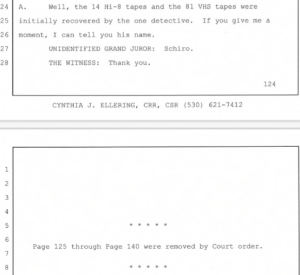The Privacy Principle
I like principles. I can usually find an underlying principle for most moral dilemmas – and once I have found that principle it is no longer a dilemma. (I should add that I neither seek nor accept any guidance from the ‘Law’ over moral issues. Too many of our laws are based not on moral principle nor even moral justice, but on vested interest. Just think about the current direction of IP laws… The Law is no guide on moral principle.)
But let’s consider privacy. For example, should Ryan Giggs have been allowed his injunction? Absolutely not.
Should El Dorado Superior Court Judge Douglas Phimister have so heavily redacted the transcript of Jaycee Lee Dugard’s grand jury testimony? Absolutely. Although I have to add that the reasons reported in The Sacramento Bee are just plain absurd:
On Thursday, he released much of the transcript of the grand jury testimony Dugard gave last September. But the judge appropriately sealed parts that were, in his words, “absolutely disgusting” and “just plain pornographic.”
Editorial: Sometimes, the public doesn’t need to know
The report implies that the reason for withholding the information was based on the ‘pornographic’ nature of the content. That would be absurd and no valid reason. A wholly valid and correct reason, however, would be to protect Ms Dugard’s personal privacy.
And that’s my dilemma. Why should Ms Dugard deserve privacy while Ryan Giggs does not? Is there an underlying privacy principle that explains it? And if there is, will it shed light on other areas of the privacy debate – such as online privacy?
I don’t know. I’m still looking. But I can tell you my current thoughts. Ryan Giggs was the perpetrator of the act he subsequently sought to keep secret. Ms Dugard was not the perpetrator of her ordeal.
So is this the principle? If you do something, even if you later regret it, you have no right to privacy over it. You must stand up, take responsibility, and face the music. But if it is done to you, without your active agreement or approval, then you have a right to privacy.
(I know that this seems to fly in the face of the droit a d’oubli so loved by our EU masters; but that so-called right defies reality. Once you have given something away, you have lost control over it; and that applies more to personal information on the internet than anything material. The droit a d’oubli is a political sop to take our attention away from the genuine privacy rights that they are taking from us – it is something that cannot be delivered, but makes us think they care.)
How would this apply online? Well, it implies that the key has to be informed choice, and the ability to opt in and out of providing information. For example, if you place personal information on Facebook, knowing that Facebook will make that information available to all and sundry, you would have no subsequent right to privacy over that information. You are doing it. However, surreptitious information harvesting, where the act is done to you rather than by you, should be prohibited by privacy laws. Use of deep packet inspection without the users’ full and informed agreement should be illegal; with the users’ full and informed approval it should be legal.


